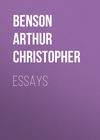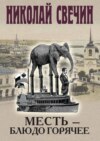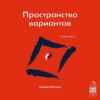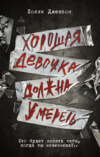Читать книгу: «Essays», страница 13
He was a wonderful instance of a man, unmethodical and dreamy by nature, made business-like by consideration for other people: his library-work was always exactly done. His own private work suffered by the rigorous self-sacrifice with which he devoted his time to the details of business: invitations and other social requirements did not come off so well. He was said frequently to neglect these. "I hardly ever go out," he used to say, though it was not for want of being asked: but it so soon got to be understood that such was his habit, and he was so welcome when he did come, though he had not announced his intention of so doing, that the delinquencies were accepted in the spirit in which they had been committed. Indeed, so great was his dislike of being forced to a decision, that it is related of him that a friend who had written to ask him to dinner, on receiving no answer, sent him two postcards, with "Yes" written on one, "No" on the other, and by return of post received them both.
When one speaks of Bradshaw's "work," it is hard to make the uninitiated quite understand either its extent, its importance, or its perfection. He knew more about printed books than any man living – he could tell at a glance the date and country, generally the town, at which a book was published. And the enormous range of this subject cannot be explained without a technical knowledge of the same. He was one of the foremost of Chaucer scholars, a very efficient linguist in range (though for reading, not speaking purposes), as, for instance, in the case of the old Breton language, which he evolved from notes and glosses, scribbled between the lines and on margins of Mass books – and his joy at the discovery of a word that he had suspected but never encountered was delightful to see. He could acquire a language for practical purposes with great rapidity – as, for instance, Armenian, which he began on a Thursday morning at Venice, and could read, so as to decipher titles for cataloguing, on Saturday night. He had a close and unrivalled knowledge of cathedral statutes and constitutions. He was an advanced student in the origins of liturgies – especially Irish – and, indeed, in the whole of Irish literature and printing he was supreme – and, finally, he was by common consent the best palæographist, or critic of the date of MSS. in the world.
The story of his adventure in the Parisian Library is worth recording here: a book had been lost for nearly a century; he went over to Paris to see if he could discover it. Search was fruitless, though there was a strong presumption as to the part of the library where it would be found. He stood in one of the classes describing its probable appearance to the librarian, and to illustrate it said, "About the height, thickness, and of similar binding to this," taking a book out of the shelves as he did so. It was the missing volume.
So too he would refer Oxford men by memory to the case and shelf of the Bodleian where they would find the book for which they had looked in vain – and most characteristic of him was the explanation which he once gave me of his enormous knowledge. "You know," he said, "I have never worked at anything for myself, except, perhaps, at Chaucer, all my life long: all the things that I do know I have stumbled across in investigating questions for other people." How much of this knowledge was merely held in solution in that amazing brain, how much was committed to paper, I do not know – of the latter, comparatively little. He had a long series of miscellaneous note-books, but most of them so technical as to be unintelligible except to one as far advanced in such knowledge as himself. His published works are but a few pamphlets.
The way in which all this work was done, all this knowledge was accumulated, was, among the other peculiarities of his genius, the most amazing. No man ever seemed to have more leisure; he would talk with perfect readiness not only on any special matter that any friend wished to consult him on, but he enjoyed trivial, leisurely gossip, and never showed impatience to continue his work, or the least desire to return to it. The secret was that he never left off. Except for rare holidays, visits to relations or foreign tours, he never left Cambridge for years. His hours were most perplexing; he would generally work very late at night, sometimes till four or five in the morning, if there was much work on hand, go to the library about eleven, return for lunch, then back to the library again, with perhaps a visit to a Board or Syndicate till tea-time – for he took no exercise except spasmodically. Then he would go into Hall, or not, as the fancy took him, on the majority of days not doing so, and tasting nothing but tea and bread-and-butter in his rooms – and then from eight o'clock he would sit there, working if uninterrupted, but with his doors generally open to welcome all intruders, ceaselessly, patiently acquiring, amassing, disintegrating the enormous mass of delicate and subtle information which not only did he never forget, but all of which he seemed to carry on the surface, and carry so lightly and easily too – for he did not appear to be erudite – he never played the rôle of the learned man, though with acquirements as ponderous and detailed, and to the generality of people as uninteresting, as the real or the fictitious Casaubon.
Yet this knowledge was not only of things that lay inside his own subjects, but extended to all kinds of paths that could never have been suspected. I have never met a person so nearly omniscient. If you wanted to hear private and personal details about a man with whom you became connected in a business or official capacity, he could give them. He drew the man, or the family, or the place he lived in. I once travelled up to London with him and pointed out a great house that was gradually getting absorbed into the creeping metropolis but which still preserved its country characteristics, stately and smoke-dried. "Yes," he said, "it used to be much fresher; I used often to go there when I was a boy; it belonged to the – " and there came out a little string of old-world anecdotes and tales. Presently we passed a church (near Barnet) with an ivied tower, which had been engulfed in the town. This also I showed him. "Yes," he said, "I was christened there."
The story is almost too well-known to require repetition, of Mommsen, who said, after half-an-hour's conversation with Bradshaw on some historical specialité: "If I had had a shorthand writer with me, I could have got in half-an-hour's talk enough materials to have made an interesting volume." And this fabric had been ceaselessly growing and expanding, fitting itself into order and connecting itself together, ever since the early days when in the school-yard at Eton, a boy who was possessed of some bibliographical treasures saw Henry Bradshaw issue out of college, carrying two curious volumes under his arms, stealing off to some secret haunt to study them, and greeted him with: "Hullo, Bradshaw, whose books have you got there?" The only answer, delivered without a sign of confusion, in the tones which even then were more expressive in their imperturbability than most men's, "Yours."
Professor Prothero, in his Life of Henry Bradshaw, gives a rationalistic explanation of this story that I can hardly credit. He says that the books were from the School Library, and that Bradshaw's reply was meant to indicate that the volumes belonged as much to one person as another. As this explanation deprives the story of most of its point and all of its humour, I have preferred to retain it in its lighter, if more apocryphal, form – the form in which I heard it from one of Bradshaw's Eton friends. And we may here add the delightful touch with which he dismissed the claims of a celebrated forger of MSS. to have been the writer of the "Codex Sinaiticus." "I am sure if he had ever seen it, he could never have pretended to have written it," he said.
And in an instant the whole structure breaks and melts before our eyes: the knowledge gone, God knows whither: the centre of so many quiet activities, of so many dependent lives slipped from its place. However often we say to ourselves that nothing runs to waste, that hoarded experience – gathered painfully in life and seemingly only to be applied in life – thus vanishing in an instant, is hidden not gone, the blank is there. As Bradshaw himself said to a friend after a great trial that he had told him of, which seemed to have in it no wholesome flavour, to be nothing either in prospect or in retrospect, but the very root of bitterness itself, "Everything is the result of something – whether it is our own fault or not, it means something: what we have to do is to try and interpret it."
And we feel that when such a life, acting as it did so directly on others and affecting them so visibly, is cut short, there is not a sheer waste of love. And though we may be called fanciful, we seem to trace a hopeful analogy in the ease with which he renewed old intimacies, silent for a long interval – he took up the friendship where he had laid it down: there was no adjustment necessary – one became part of his life again at once, because one had never ceased to be so. Such an affection, when it has passed the veil, seems to be waiting for us still – it seems emphatically to have but gone before.
1885.
CHRISTINA ROSSETTI
FEW poetical writers lived more consistently in the shadow of death than Christina Rossetti. There was a certain taint of doom about her writings from the first, and something of the hollow-eyed listlessness of low vitality, that characterises the artistic work of the school to which she primarily belonged, is never absent for very long together from her writings. There is extant a portrait of her at about the age of thirty-six, by her brother, Dante Gabriel Rossetti, which will be familiar to many of my readers. After subtracting from it the languorous mannerism of the artist, there remains in the wide, pathetic eyes, the wistful uplifting of the eyebrows and the depressed curves of the stately mouth something dreary and uncomforted about the whole aspect. And a later photograph, which I have had the privilege of seeing, has the same regretful patience. For many years she had been an invalid, and lived a life of singular seclusion in Torrington Square, one of the dreariest and least romantic of London thoroughfares. Latterly she had been an acute sufferer from a wearing disease, borne with silent fortitude. One after another, her mother, and the two aunts to whom she devoted her tenderest care, were taken from her; and her brother William Michael, the critic and editor of Shelley, was the only survivor of the brilliant circle in which her life began. Her fervent religious faith, inspired and matured by desolate experience, had nothing dreary or undecided about it; it issued in a sedulous dutifulness and a patient devotion that were the best proof of its sincerity.
Her artistic nature developed early, and before she was seventeen, a little volume entitled Verses by Christina Rossetti, dedicated to her mother, was printed by her maternal grandfather, Gaetano Polidori, at his private printing-press in Regent's Park. This is now one of the rarest of bibliographical treasures. Here her precise delineation of natural objects, and a certain delicate antique charm, are distinctly observable. But in 1850, under the nom-de-plume of Ellen Alleyne, she contributed verses to the Germ, that fertile organ of the pre-Raphaelites, Holman Hunt, Thomas Woolner, Dante Gabriel Rossetti, and others. Of these lyrics we shall presently have occasion to quote one, "Dreamland," which shows how early her lyrical gift had matured. And indeed it may be said that of the seven poems which she contributed to the Germ, at least five are among her best lyrics.
In 1862 appeared Goblin Market and other Poems; and in this, as is so often the case with the work of poets done before the thirty-fifth year – the year that has so often been fatal to genius – she reached the zenith of her poetical powers. Not that much of her later work was not excellent, and would have sufficed for a definite reputation; but it may be said that twenty or thirty of these earlier poems are those by which she will be best remembered.
Some writers have the power of creating a species of aerial landscape in the minds of their readers, often vague and shadowy, not obtruding itself strongly upon the consciousness, but forming a quiet background, like the scenery of portraits, in which the action of the lyric or the sonnet seems to lie. I am not now speaking of pictorial writing, which definitely aims at producing, with more or less vividness, a house, a park, a valley, but lyrics and poems of pure thought and feeling, which have none the less a haunting sense of locality in which the mood dreams itself out.
Christina Rossetti's mise-en-scène is a place of gardens, orchards, wooded dingles, with a churchyard in the distance. The scene shifts a little, but the spirit never wanders far afield; and it is certainly singular that one who lived out almost the whole of her life in a city so majestic, sober, and inspiriting as London, should never bring the consciousness of streets and thoroughfares and populous murmur into her writings. She, whose heart was so with birds and fruits, cornfields and farmyard sounds, never even revolts against or despairs of the huge desolation, the laborious monotony of a great town. She does not sing as a caged bird, with exotic memories of freedom stirred by the flashing water, the hanging groundsel of her wired prison, but with a wild voice, with visions only limited by the rustic conventionalities of toil and tillage. The dewy English woodland, the sharp silences of winter, the gloom of low-hung clouds, and the sigh of weeping rain are her backgrounds; and it is strange that one of Italian blood should write with no alien longings for warm and sun-dried lands. Robert Browning, who brings into sudden being by a word, the whole atmosphere of the fiery Italian summer, the terraced vines, the gnarled olive, the bulging plaster where the scorpion lies folded, still yearned for an English spring morning. But Christina Rossetti, unlike even her brother, had no leanings to the home of her race.
The critic of future ages, if he were confronted with the works of Mrs. Browning and Miss Rossetti, and a history of their lives, would, it may be said, acting on internal evidence only, assign such poems as Aurora Leigh and the Casa-Guidi Windows to Miss Rossetti, and trace the natural heart-beats which still thrilled her for the home of her origin, and equally attribute the essentially English character of Miss Rossetti's feeling to the English poetess. It is said that Miss Rossetti never visited Italy, and had no wish to do so. It is a strange thing that the two greatest of English poetesses should have, so to speak, so passionately adopted each other's country as their own.
The only point in which Christina Rossetti's imagery may be held to be tropical, is in the matters of fruit. In "Goblin Market," in the "Pageant of the Months," even in such a poem as the "Apple Gathering," and in many other poems she seems to revel in descriptions of fruit which the harsh apples and half-baked plums of English gardens can hardly have suggested. Keats is the only other English poet who had the same sensuous delight in the pulpy juiciness of summer fruit. It will be found, I think, that in the majority of English poets fruit is quite as often typical of immaturity and acidity as of cooling and delight. And even Stevenson couples the onion and the nectarine as the noblest fruits of God's creation. But the
Plump unpecked cherries.
Bloom down-cheeked peaches,
Wild free-born cranberries,
Pineapples, strawberries,
All ripe together
In summer weather.
are hardly the produce of the rushy glen where the leering goblin merchants tramped and whisked up and down.
This leads me to speak of another region which Christina Rossetti trode with an eager familiarity – the land of dreams and visions. With the exception of Coleridge, who, in his three great poems, moved in that difficult and turbid air with so proud a freedom, it may be said that no English poet except Christina, her brother, and James Thomson, have ever successfully attempted such work. Mr. Yeats, it is true, of younger writers, has passed beyond the threshold of that eerie and unsubstantial land; but with him it is the melancholy Celtic twilight, the home of old earth-spirits, neither high nor hopeful, but with a bewildered sadness, as of discrowned kings and discredited magicians. To a characteristically English poet such as Wordsworth, such a region, as he betrays in the memorable sonnet, "The world is too much with us," was a place of desperate soulless horror. But Christina Rossetti, in "Goblin Market," and the "Ballad of Boding," as her brother in "Rose Mary," and "Sister Helen," passed successfully along the narrow road of allegory. In English hands such subjects are apt to pass with fatal swiftness into the ludicrous and the grotesque. Witness the merry horned demons of monkish MSS., and the cheerful oddities, so far aloof from fantastic horror, of our English gurgoyles and stall-work, the straddling and padding forms of Bunyan. What is needed is a sort of twilight of the soul, a simple directness such as children value, a sense of grave verisimilitude, hopelessly alien from the business-like Puritan mind.
Then, too, there is the singular creation of the modern ballad, initiated by Coleridge, and carried to supreme perfection by D. G. Rossetti, and in a less degree by his sister; that vague, dream-laden writing which, using old forms of austere simplicity, charges them with a whole world of modern sicknesses and degenerate dreams. It was this that Matthew Arnold went so passionately in search of in a poem like the "Scholar Gipsy," and yet could contrive no inner picture of the haunted wanderer's thoughts, but only touch in the external aspects of the phantom traveller, as seen unexpectedly by human toilers and pleasure-seekers engaged in homely exercises.
But Miss Rossetti, in such poems as "Brandons Both," and in a supreme degree in the exquisite ballad of "Noble Sisters," which we will quote in extenso, laid a secure hand on the precise medium required: —
NOBLE SISTERS
"Now did you mark a falcon,
Sister dear, sister dear,
Flying toward my window
In the morning cool and clear?
With jingling bells about her neck.
But what beneath her wing?
It may have been a ribbon,
Or it may have been a ring."
"I marked a falcon swooping
At the break of day;
And for your love, my sister dove,
I 'frayed the thief away."
"Or did you spy a ruddy hound,
Sister fair and tall,
Went snuffing round my garden bound,
Or crouched by my bower wall.
With a silken leash about his neck;
But in his mouth may be
A chain of gold and silver links,
Or a letter writ to me?"
"I heard a hound, highborn sister,
Stood baying at the moon;
I rose and drove him from your wall,
Lest you should wake too soon."
"Or did you meet a pretty page,
Sat swinging on the gate;
Sat whistling, whistling like a bird —
Or may be slept too late —
With eaglets broidered on his cap,
And eaglets on his glove?
If you had turned his pockets out,
You had found some pledge of love."
"I met him at this daybreak,
Scarce the east was red;
Lest the creaking gate should anger you,
I packed him off to bed."
"Oh patience, sister. Did you see
A young man tall and strong,
Swift-footed to uphold the right
And to uproot the wrong,
Come home across the desolate sea
To woo me for his wife?
And in his heart my heart is locked,
And in his life my life."
"I met a nameless man, sister.
Who loitered round our door;
I said: 'Her husband loves her much.
And yet she loves him more.'"
"Fie, sister, fie; a wicked lie,
A lie, a wicked lie.
I have none other love but him,
Nor will have till I die;
And you have turned him from our door,
And stabbed him with a lie.
I will go seek him through the world
In sorrow till I die."
"Go seek in sorrow, sister,
And find in sorrow too;
If thus you shame our father's name,
My curse go forth with you."
But such writings, exquisite as they are, are but the outworks and bastions of the inner life. One could almost wish that Christina Rossetti were further removed by time and space, and were passed beyond the region of letters, biographies, and personal memoirs, which before long will possibly begin "to tear her heart before the crowd." Nowadays, in the excessive zest for personal information, which received such shameful incentives from Carlyle, and still more shameless encouragement from his biographers, we may thank God, as Tennyson did, that there are yet poets of whom we know as little as we know of Shakespeare, about whom even the utmost diligence of researchers has disinterred but a handful of sordid and humiliating facts.
But Miss Rossetti's poems are so passionately human a document as to set one tracing by a sort of inevitable instinct the secrets of a buoyant and tender soul, sharpened and refined by blow after blow of harsh discipline. The same autobiographical savour haunts all her work as haunted the eager dramas of Charlotte Brontë, the first of women-writers of every age. Step by step it reveals itself, the sad and stately development of this august soul. The first tremulous outlook upon the intolerable loveliness of life, the fantastic melancholy of youth, the deep desire of love, the drawing nearer of the veiled star, disappointment, disillusionment, the over-powering rush of the melancholy, that had waited like a beast in ambush for moments of lassitude and reaction. Then was the crisis: would the wounded life creep on on a broken wing, or would the spiritual vitality suffice to fill the intolerable void? It did suffice; and the strength of the character that thus found repose was attested by the rational and temperate form of faith that ministered to the failing soul.
At such a moment the sensuous spirit is apt to slide into the luxurious self-surrender that Roman Catholicism permits. To me, indeed, it is a matter of profound surprise that Miss Rossetti did not fall into this temptation; but just as she had, with instinctive moderation, chosen the cool and temperate landscape of her adopted country, so the National Church of England, with its decorous moderation, its liberal generosity, its refined ardour, was the chosen home of this austere spirit. The other danger to be feared was that of a bitter renunciation of old delights, a sojourn in the wilderness of some arid and fantastic pietism. An elder sister of Miss Rossetti's indeed sought the elaborate seclusion of a religious house; and had D. G. Rossetti – to use the uncouth Puritan phrase – "found religion," there is no doubt that he too would have reverted to the Church of his fathers. But Miss Rossetti became, as Mr. Edmund Gosse has, in a penetrating criticism in the Century Magazine (June 1893) pointed out, the poetess, not of Protestantism, but of Anglicanism.
We must retrace our steps for a moment, and touch first on Miss Rossetti's love lyrics. Very occasionally she allowed herself, in the early days, to speak of love with the generous abandon of an ardent spirit, as in the exquisite lyric where she still lingers in the pictorial splendours of the pre-Raphaelite school.
A BIRTHDAY
My heart is like a singing bird
Whose nest is in a watered shoot;
My heart is like an apple-tree
Whose boughs are bent with thickset fruit;
My heart is like a rainbow shell
That paddles in a halcyon sea;
My heart is gladder than all these,
Because my love is come to me.
Raise me a daïs of silk and down;
Hang it with vair and purple dyes;
Carve it in doves and pomegranates
And peacocks with a hundred eyes;
Work in it gold and silver grapes,
In leaves and silver fleur-de-lys;
Because the birthday of my life
Is come, my love is come to me.
But, as a rule, her thoughts of love are clouded by some dark sense of loss, of having missed the satisfaction that the hungering soul might claim. Take two sonnets:
REMEMBER
Remember me when I am gone away,
Gone far away into the silent land,
When you can no more hold me by the hand,
Nor I half turn to go, yet turning stay.
Remember me when no more day by day
You tell me of our future that you planned;
Only remember me. You understand,
It will be late to counsel then or pray.
Yet, if you should forget me for a while,
And afterwards remember, do not grieve;
For if the darkness and corruption leave
A vestige of the thoughts that once I had,
Better by far you should forget and smile,
Than that you should remember and be sad.
AFTER DEATH
The curtains were half-drawn, the floor was swept
And strewn with rushes; rosemary and may
Lay thick upon the bed on which I lay,
Where through the lattice ivy-shadows crept.
He leaned above me, thinking that I slept
And could not hear him; but I heard him say,
"Poor child, poor child!" and as he turned away
Came a deep silence, and I knew he wept.
He did not touch the shroud, or raise the fold
That hid my face, or take my hand in his,
Or ruffle the smooth pillows for my head.
He did not love me living; but once dead
He pitied me; and very sweet it is
To know he still is warm, though I am cold.
In these sonnets the veil of some pathetic possibility unfulfilled is drawn reverently aside, and the soul-history is written in plain characters. But again the poet is more reticent; and only in sad allusions, incessantly recurring, in unhappy hints, she reveals the hunger of the spirit, the hand that was held out in hope for the heavenly bread, and closed upon a stone. After this the mood becomes one of reluctant certainty, with little bitterness or recrimination; the surrender is accepted, but the thought of what might have been is for ever present.
Then, as in some desolate estuary, the tide begins to set strongly in from the vast and wholesome sea. Sometimes a stoic note is struck of pure desolation, as in the noble lyric; —
UP-HILL
Does the road wind up-hill all the way?
Yes, to the very end.
Will the day's journey take the whole long day?
From morn to night, my friend.
But is there for the night a resting-place,
A roof for when the slow dark hours begin?
May not the darkness hide it from my face?
You cannot miss that inn.
Shall I meet other wayfarers at night,
Those who have gone before?
Then must I knock, or call when just in sight?
They will not keep you standing at that door.
Shall I find comfort, travel-sore and weak?
Of labour you shall find the sum.
Will there be beds for me and all who seek?
Yea, beds for all who come.
But this bitterness is not enduring. From the first, even in what we may call her Pagan days, the sense of responsibility and deliberate choice had been hers. We venture to quote the noble allegory, "A Triad," omitted, in some vigorous revulsion of spirit, from her later writings:
Three sang of love together, one with lips
Crimson, with cheeks and bosom in a glow,
Flushed to the yellow hair and finger tips;
And one there sang who, soft and smooth as snow,
Bloomed like a tinted hyacinth at a show;
And one was blue with famine after love,
Who, like a harpstring snapped, rang harsh and low
The burden of what those were singing of.
One shamed herself in love; one temperately
Grew gross in soulless love, a sluggish wife;
One famished, died for love. Thus two of three
Took death for love, and won him after strife.
One droned in sweetness like a fattened bee;
All on the threshold, yet all short of life.
Into the service, then, of her religion, Miss Rossetti brought all the passionate fervour of her unsatisfied heart, all her intense enthusiasm after art, and passed steadily, we believe, to the forefront of all English religious poetry. She had not, perhaps, the curious felicity of George Herbert, but, on the other hand, she had the balanced simplicity that stepped clear of his elaborate conceit, the desperate euphuism of Crashaw, and even the pathetic refinement of Henry Vaughan. Again, her passionate imagery put her ahead of the soft beauty of Keble, too apt to degenerate into a honied domesticity; above the pensive richness of Charles Wesley, whose Puritan outlook made his hand unsure; above even the divine ardour of Newman, whose technical dogmatism and paucity of human experience limited his range. With Miss Rossetti it was as the strong man armed, in the Gospel parable. When the stronger victor came, the spoil was annexed, and the ancient pride of defence was applied by a more dexterous hand. Can there be found in the rank of English religious poetry two more majestic lyrics than
A BETTER RESURRECTION
I have no wit, no words, no tears;
My heart within me like a stone
Is numbed too much for hopes or fears.
Look right, look left, I dwell alone;
I lift mine eyes, but, dimmed with grief,
No everlasting hills I see;
My life is in the falling leaf.
O Jesus, quicken me.
My life is like a faded leaf,
My harvest dwindled to a husk;
Truly my life is void and brief
And tedious in the barren dusk.
My life is like a frozen thing,
No bud nor greenness can I see.
Yet rise it shall – the sap of spring.
O Jesus, rise in me.
My life is like a broken bowl,
A broken bowl that cannot hold
One drop of water for my soul
Or cordial in the searching cold.
Cast in the fire the perished thing;
Melt and remould it, till it be
A royal cup for Him, my King.
O Jesus, drink of me.
Or the third of the "Old and New Year Ditties?"
Passing away, saith the World, passing away;
Chances, beauty, and youth sapped day by day;
Thy life never continueth in one stay,
Is the eye waxen dim, is the dark hair changing to grey
That hath won neither laurel nor bay?
I shall clothe myself in Spring and bud in May;
Thou, root-stricken, shall not rebuild thy decay
On my bosom for aye.
Then I answered, Yea.
Passing away, saith my Soul, passing away,
With its burden of fear and hope, of labour and play.
Hearken what the past doth witness and say:
Rust in thy gold, a moth is in thine array,
A canker is in thy bud, thy leaf must decay.
At midnight, at cockcrow, at morning, one certain day,
Lo! the Bridegroom shall come and shall not delay;
Watch, thou, and pray.
Then I answered, Yea.
Passing away, saith my God, passing away;
Winter passeth after the long delay;
New grapes on the vine, new figs on the tender spray,
Turtle calleth turtle in Heaven's May.
Though I tarry, wait for Me, trust Me, watch and pray,
Arise, come away, night is past, and lo! it is day,
My love, My sister, My spouse, thou shalt hear Me say.
Then I answered, Yea.
The last-mentioned poem is indeed worthy of a technical remark. It is written in an irregular dactylic metre, the longer lines having a beat of five accents, the shorter of three or two; but the whole scheme of rhyme, all three stanzas – a common form with Miss Rossetti – is actually built upon one single rhyme throughout. For such a conception one would be inclined to predicate certain failure; the simplicity is too rude and daring; but consider the result. For sheer simplicity again note her "Christmas Carol":































